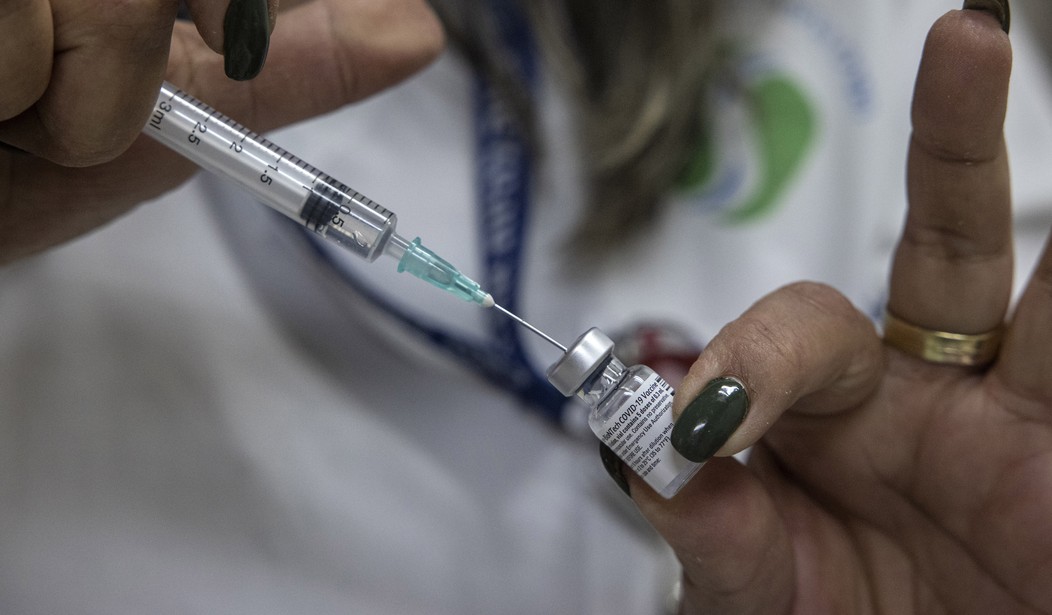Welcome to the party, pals. The FDA did beat their Labor Day projection for full approval of the Pfizer vaccine against COVID-19. But what took so long?
BREAKING: The FDA grants full approval to Pfizer’s Covid vaccine. https://t.co/0VJBuAs1C2 pic.twitter.com/Qd5yxtlakD
— CNBC (@CNBC) August 23, 2021
“They only have to give it to four billion people before it’s okayed,” Jim Kramer quips with derision. “Not bad. It really is kind of a farce,” he adds, and he’s correct.
CBS News calls this a “sprint,” for some reason:
The approval caps a months-long “sprint” by the FDA to clear the shot’s final remaining regulatory hurdles in record time, scrutinizing reams of the company’s latest safety data and conducting inspections at Pfizer’s vaccine factories around the world.
“While millions of people have already safely received COVID-19 vaccines, we recognize that for some, the FDA approval of a vaccine may now instill additional confidence to get vaccinated. Today’s milestone puts us one step closer to altering the course of this pandemic in the U.S.” said the FDA’s Acting Commissioner Janet Woodcock said in a statement.
Pfizer completed its submission of a “biologics license application” for the shot in May, providing the extensive documentation required for full approval, and has told investors it plans to seek full approval for younger age groups and a booster shot.
Moderna said it plans to finish its application this month. Johnson & Johnson, which is currently gathering data from trials of two-dose regimens, also plans to file for full approval this year.
One cannot blame the FDA for not granting that which has not yet been sought. However, the fact that these manufacturers have to spend this much time putting their applications together after nine months of full-spectrum usage among adults suggests that the FDA might have more hurdles than help in this process, especially for vaccines that target an acute public-health emergency, even one as novel as COVID-19. These aren’t long-term therapeutics, after all, but vaccines that are only administered once or twice. We had over 20 million Americans vaccinated by January 20, a rather large sample size that should have produced plenty of data on safety and efficacy within a couple of months.
Now that Pfizer no longer operates under an emergency use authorization, the hope is that full approval will boost vaccination rates:
The U.S. gave full approval to Pfizer’s COVID-19 vaccine on Monday, a milestone that may help lift public confidence in the shots as the nation battles the most contagious coronavirus mutant yet.
The vaccine made by Pfizer and its partner BioNTech now carries the strongest endorsement from the Food and Drug Administration, which has never before had so much evidence to judge a shot’s safety. More than 200 million Pfizer doses already have been administered in the U.S. — and hundreds of millions more worldwide — since emergency use began in December.
“The public can be very confident that this vaccine meets the high standards for safety, effectiveness and manufacturing quality the FDA requires of an approved product,” said acting FDA Commissioner Janet Woodcock. “Today’s milestone puts us one step closer to altering the course of this pandemic in the U.S.”
The U.S. becomes the first country to fully approve the shot, according to Pfizer, and CEO Albert Bourla said in a statement he hoped the decision “will help increase confidence in our vaccine, as vaccination remains the best tool we have to help protect lives.”
It certainly can’t hurt to have this vote of confidence in Pfizer, but people may have already gotten past that issue. Vaccinations have already been increasing for the past six weeks, as the CDC data shows:

What changed? The biggest factor in this time frame is the dire Delta variant reporting, not vaccine safety or efficacy. In fact, the news on the latter has not been encouraging, as the Delta variant appears to cause more breakthrough infections, although not hospitalizations and death among the vaccinated. It’s still a variant that does almost all of its damage among the unvaccinated, and that seems to have been a powerful motivator to go get the shot. The seven-day daily average of vaccinations is now the highest it has been since Delta became dominant in the US.
One other note on this: will CDC be able to differentiate between regular inoculations and booster shots? Only the immune suppressed are technically eligible for third-shot boosters, but you know that others are beginning to take advantage of walk-ups to get a booster at this point. It’s unlikely that those have impacted the trajectory of vaccinations in this chart yet, but unless the CDC has a good way to measure and report boosters separately, it might get even tougher to determine the immune status of the population — especially since we still aren’t doing population testing.
Let’s hope that the FDA’s marathon to approval still matters enough at this point to get more people to their first shot.









Join the conversation as a VIP Member